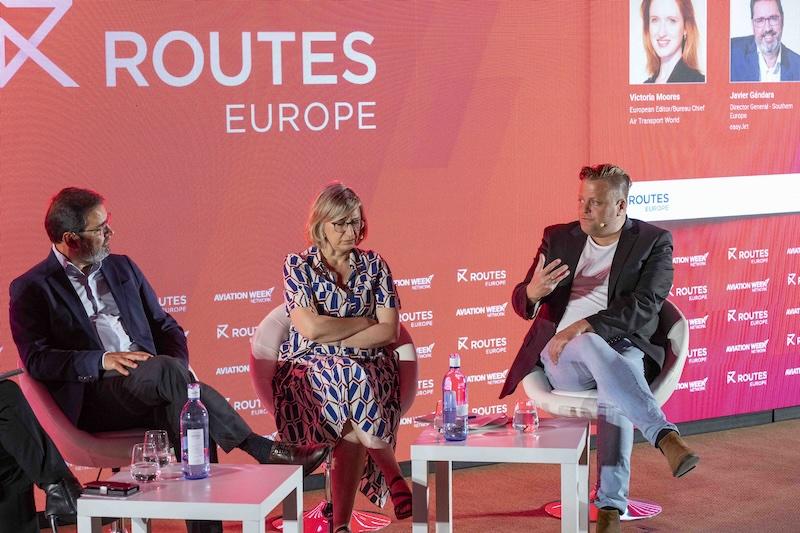
From left, easyJet's Javier Gándara, Aena's Susana Gallart Peñas and TUI's Aage Dünhaupt.
SEVILLE, Spain—Executives at two European airline companies and a major airport operator expressed confidence that aviation will meet its 2050 net zero carbon goals, but stressed that action within the next five years—and the availability and affordability of sustainable aviation fuel (SAF)—will be critical.
UK LCC easyJet Director General Javier Gándara, TUI director of communications for airlines, hotels and cruises, Aage Dünhaupt, and Aena head of environmental sustainability, Susana Gallart Peñas, discussed aviation sustainability last week during a conference panel at Routes Europe 2025 in Seville.
All were asked how confident they were in the air transport industry being able to achieve the self-imposed net zero goal after IATA Director General Willie Walsh acknowledged earlier this year that the 2050 target may slip because of government policies and the lack of SAF.
But the panelists remained optimistic.
“I think it will still be possible. Thirty years ago, people were saying flying would not be affordable and now it is. We have a clear roadmap,” easyJet’s Gándara said. “SAF is something that will be important in the short, medium and long term. At easyJet, we are working with Airbus on developing a hydrogen-powered, zero-emissions aircraft. The problem is with regulators. They have to have political courage. They have to work to get SAF production scaled up and to address issues like action on the [European Union air traffic management modernization] Single European Sky.”
Aena’s Gallart Peñas, whose company manages 46 airports and two heliports in Spain and participates directly and indirectly in the management of some 16 airports in Europe and the U.S., agreed—but she also stressed the time to move the dial on aviation sustainability is running short.
“2050 must be possible, but the next five years will be critical for us,” she said. “I think we have just five years to change things.”
TUI’s Dünhaupt added: “You have to be ambitious, and when you have targets, they should be ambitious. But we don’t want to change the behavior of flying. We need politicians’ support for things to happen, and SAF is a big part of the solution. But we also need to do some honest stock-taking, and if there’s not enough SAF, we need to move the [net zero] target to the right.”
Dünhaupt also said that North American sustainability policy would be different under U.S. President Donald Trump and that it is important that competitive playing fields remain level across the air transport industry, which is global, as sustainability rules and mandates come into effect.
Gándara agreed. “The biggest challenge is that sustainability doesn’t affect air travel affordability,” he said. Gándara also emphasized that European regulators are missing “a huge opportunity for Europe to become energy self-sufficient” if they do not take action on scaling up SAF production.





